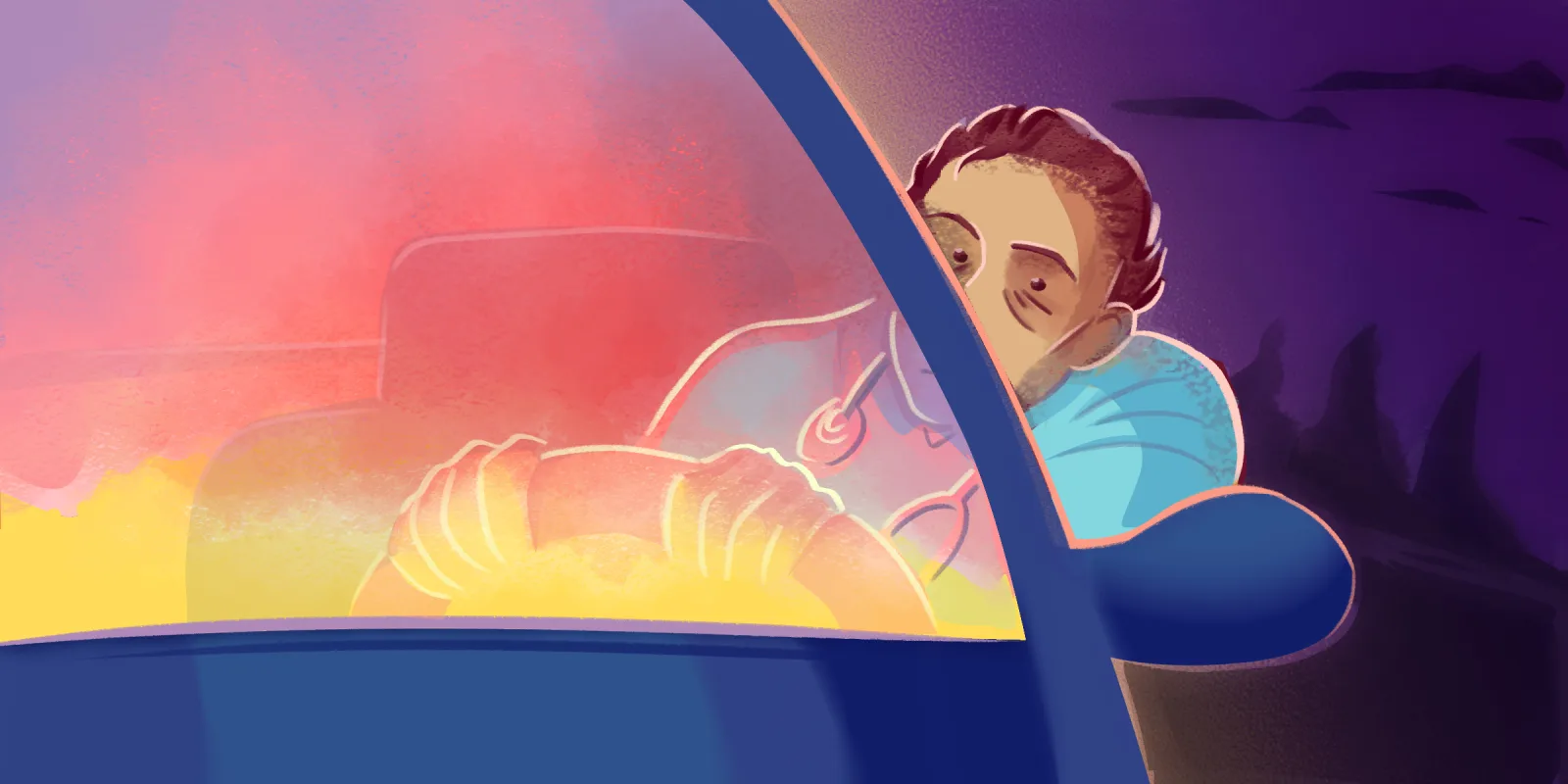I awoke to a sky streaked with the colors of an inviting fire on a cold night. All the warm colors from rose-red to gold contrasted with the cerulean night sky as it surrendered to dawn. It looked like the finger painting of the gods.
It was a sight that should have made me feel warm and comfortable. But it did not. Something was terribly wrong. For one thing, I was seeing it through the windshield of my car. A car parked inexplicably on the side of a lonely rural road. For another thing, I was anything but warm.
This was how I woke up on the side of a highway with no idea how I had gotten there. Worst of all, it was a night in February on a highway in rural Wisconsin, a place where the overnight low is routinely in the teens. Despite my heavy down parka and fur-lined gloves, I was lethargic from the cold. How had I gotten there?
Four days before, I had started a long weekend of call. That first night, the ED called me to see a man who had experienced the sudden onset of severe abdominal pain and then collapsed at home. Fortunately for him, his home was only one block from the hospital. A neighbor had loaded him into a car and drove him the short distance to the ER. The man had suffered a ruptured abdominal aortic aneurysm and was on the edge of life. I took him directly to the OR and repaired the aneurysm. The surgery went well, but the patient’s blood pressure remained weak despite blood, fluids, and vasopressors. His kidney produced a scant few drops of urine and his oxygenation was poor despite aggressive use of the ventilator.
I put him in the ICU to give him the minute-to-minute care he would need if he was going to survive. At that time, the hospital I worked in did not have hospitalists or intensive care physicians, so a transfer to the ICU meant that the surgeon on the case — me — was the one who would provide that intense care, minute-to-minute, 24 hours a day.
I got updates on the patient roughly every 90 minutes for the next four days. I was lucky if I could get an hour's sleep at a time, though of course I couldn't because I was also on call for all other surgical emergencies. On the fourth night of call, the ER of a small outlying hospital summoned me. They had a teenage girl with abdominal pain that they suspected was appendicitis. At that time, CT was not yet advanced enough to use for routine appendicitis diagnoses, which meant a surgeon had to lay hands on the patient and make the diagnosis clinically. So I got in my car and drove the 25 minutes to the rural hospital.
I agreed that the young lady had appendicitis and needed an appendectomy and, since I was already there, and needed to be back at the main hospital in the morning for my regular workday, I decided to do her surgery around midnight. I called in the surgical team and then took a seat in the doctors' lounge to wait for them. That was when things got weird.
As I sat in the lounge, my mentor from surgical residency walked in. He did not say a word. He just gave me a melancholy look that said, “I know it’s rough, but you will get through it.” Then he took a seat and wordlessly waited with me. The problem was that my mentor was in a different state when this happened. I vaguely knew that, but did not know what to do with that knowledge. My sleep-deprived brain was hallucinating, and I lacked the faculties to recognize it.
I honestly don't remember anything after the hallucination began. I did remove the girl's appendix, but I was the equivalent of black-out drunk at the time. Thankfully, there were no complications. My only defense for my profoundly poor decision to operate in that condition was that I was too mentally impaired to have any insight into how compromised I was. The next thing I remember after seeing my mentor was waking up on the side of the highway. Ironically, it was my pager going off with an "update" from the ICU that may have saved me from freezing to death. The car had been parked long enough, probably a couple of hours, that all of the heat had leached out of it. Who knows how much longer I would have remained passed out there before I succumbed to hypothermia.
After the call, I started the car and drove home, heat cranked up, seat warmer on high. I did not begin shivering until I was in the shower. I turned the water up as hot as I could tolerate, and only then did I start to shake uncontrollably, mainly from the body chill but also from the realization that I might not have ever made it home. I sat curled up on the floor of the shower until the hot water ran cold. Then I dressed in a T-shirt, a long-sleeve shirt, and a wool sweater. Despite all of those layers of clothes, I felt a chill for the rest of that day.
In the end, the aneurysm patient did survive his surgery but succumbed to lung cancer within the year. The girl with appendicitis recovered without incident. I, however, was shaken by my experience. I grappled with the thought that overwork had nearly killed me. My career had nearly killed me. And not in some cool, dramatic Hollywood movie way, but cold and alone on the side of an empty highway. I kept imagining my wife and young family getting the news after the Sheriff found my body. I was angry with my work for what it had done to me.
But was my career really to blame?
Or was I?
As a surgical resident, I had two rules drilled into me. One: “The patient always comes first." Two: "Show no weakness." I took those lessons to heart. But there was a difference in residency: I wasn't on call for multiple days in a row. I could get through one night without sleep, I’d learned how to do it. I had not learned how to go without sleep for multiple nights. I hadn’t learned what my limit was.
We all have limitations — even Navy SEALs have sleep requirements. We all need to eat, rest, exercise, and spend time with those we love. That night, I learned that to avoid this truth is to risk disaster. What I had done put both my patients and myself at risk. Fortunately, no one was harmed, but that may have been pure dumb luck.
I know now that what I should have done was ask for help. It wasn't the situation that nearly killed me; it was my unwillingness to admit my limitations and ask for assistance. At the end of my fourth sleepless night, I asked one of my partners to take calls on my ICU patient so that I could get a good night's sleep. Then I went home, sat on the couch, and promptly passed out. I slept for twelve hours, which was good because in another 24 hours, I would be on call again.
The temptation to always push ourselves just a little farther is real. But there are limits to what we can endure. Having limits is not a weakness. Weakness is failing to recognize your limits or being unwilling to ask for help when you need it. Weakness is self-denial that can get people hurt. So, build up the courage to recognize your limitations and have the humility to ask for help when you need it. It could save a life. That life might even be your own.
Have you had experiences during the course of your clinical practice when you pushed yourself too far? Share what happened — and what you learned — in the comments below.
Charles Black was born and raised among the cornfields of rural Iowa, but moved to the Colorado mountains as soon as he got the chance. He is a general surgeon, writer, photographer, outdoorsman, trail runner, and fires-side philosopher. His musing on medicine and life in general can be found here and you can view his photography here. Dr. Black was a 2019-2020 Doximity Op-Med Fellow and is currently a 2020–2021 Doximity Op-Med Fellow.
Illustration by April Brust







